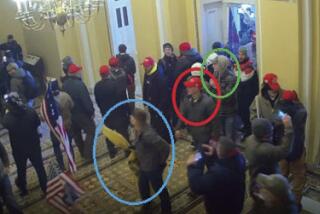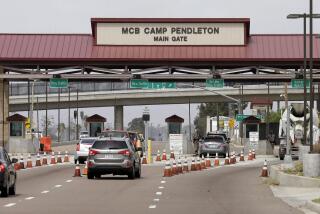Tustin Marine Pleads Guilty to Desertion : Court-martial: Cpl. Darrell Spencer is sentenced to a year in the brig, demoted, and stripped of pay and benefits.
- Share via
EL TORO — A Marine mechanic who declared the Persian Gulf War to be both illegal and immoral pleaded guilty to desertion Friday and was sentenced to one year in the brig.
Cpl. Darrell Spencer--one of a small number of local military deserters--was also stripped of his pay and benefits, demoted to private and given a dishonorable discharge at his general court-martial.
Because of a pretrial agreement struck with the Marine Corps, however, Spencer, 23, may be freed within four months. He was apprehended in Stockton in August after being absent without leave for five months, and he has already served more than three months in confinement at Camp Pendleton. Spencer, an avionics technician, was turned in to authorities by his mother.
Spencer told Col. Edwin Welch, the military judge hearing the case, that after Iraq first invaded Kuwait in August of 1990, “I was like every other gung-ho Marine that wanted to go over there and kill somebody.” Spencer had been based with a helicopter squadron in Tustin but was reassigned to a Gulf-bound unit at Camp Pendleton in January. He said he came to change his views, particularly after reading literature from a radical group called New Nation USA. The stepfather of Spencer’s fiancee in Stockton is a leader of the group.
Spencer, an Oklahoma native who wants to become a lawyer, said he became convinced that President Bush acted illegally in sending troops to the Persian Gulf without first securing congressional approval. He acknowledged that when the military rejected his request for a discharge, he decided to flee in February to avoid service.
In doing so, Spencer became one of more than 11,300 military personnel to reportedly go AWOL or desert their units altogether between October, 1990, and last March, amid the military buildup and war in the Gulf. The small number other county residents to desert include John Dickinson, a former Santa Ana schoolteacher and Air Force reservist who refused to fight. Dickinson was released from prison earlier this week.
Spencer declared at his court-martial that, “in my mind, going to Saudi Arabia would have been in direct contradiction to what I had taken an oath (as a Marine) to do--to protect and defend the Constitution. . . . I always knew that our government was corrupt, and I kind of felt that the war was not in the best interests of the United States.”
But Capt. John Prew, the Marine Corps’ prosecutor in the case, painted a far different portrait of the defendant, describing him as a lackluster Marine who was afraid of war.
“When it really came down to what it means to be a Marine . . . , he didn’t go; he deserted,” Prew said. “He used his political affiliation to get out of here. . . . He’s a coward with an excuse.”
In statements made after his arrest in August, Spencer and family members had indicated that he would fight the desertion charge on the grounds that his status as a member of New Nation USA and a declared “expatriate” of the United States freed him from duty.
Spencer ultimately agreed to plead guilty to the desertion charge after he struck a deal with the Corps that would limit his maximum confinement to seven months. He had faced up to five years’ imprisonment as a wartime deserter.
“We thought it was a good deal,” said W. Patrick Resen, a San Ramon civilian lawyer who co-defended Spencer. “It limits the possible punishment.”
The contents of the plea agreement, in accordance with the military judicial system, were kept from Col. Welch as he heard testimony in the case throughout the day.
Had Welch sentenced Spencer to less than seven months, that lesser figure would have become his sentence. But because a more severe one was imposed, the seven-month plea-bargain agreement stands. The remaining five months that the judge ordered him to serve will be suspended unless Spencer has discipline problems during his confinement at Camp Pendleton, officials said.
Welch told Spencer: “I’m convinced that you are an intelligent young man who gave a great deal of thought to what you did. . . . (But) this is a very serious matter.”
Spencer’s attorneys spent much of the hearing trying to show that the conditions of the defendant’s confinement at Camp Pendleton have not been adequate and that he has not had reasonable access to such amenities as medicine, television, recreation and phones. As a result, they argued, he should be given credit for additional time beyond the 95 days he has actually served.
Welch rejected that argument, saying that he found Spencer’s treatment in the brig as he awaited trial to be reasonable and “not arbitrary.”
More to Read
Sign up for Essential California
The most important California stories and recommendations in your inbox every morning.
You may occasionally receive promotional content from the Los Angeles Times.










